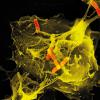The World Health Organization (WHO) has recommended a new vaccine, R21/Matrix-M, for the prevention of malaria in children.

The R21 vaccine is the second malaria vaccine recommended by WHO, following the RTS,S/AS01 vaccine, which received a WHO recommendation in 2021.
Both vaccines are shown to be safe and effective in preventing malaria in children and, when implemented broadly, are expected to have high public health impact.

The vaccine has been developed by the University of Oxford and there are already agreements in place to manufacture more than 100 million doses a year.
Demand for malaria vaccines is unprecedented; however, available supply of RTS,S is limited. The addition of R21 to the list of WHO-recommended malaria vaccines is expected to result in sufficient vaccine supply to benefit all children living in areas where malaria is a public health risk.
Image credit | Shutterstock | iStock




